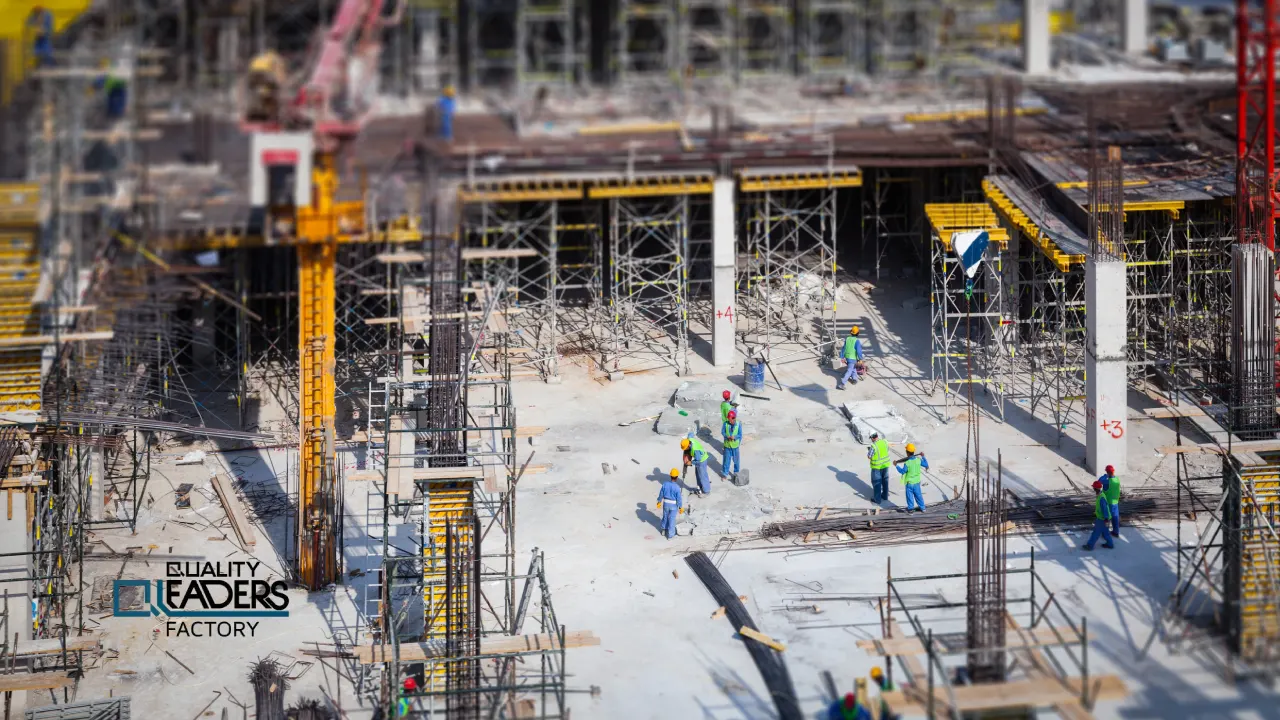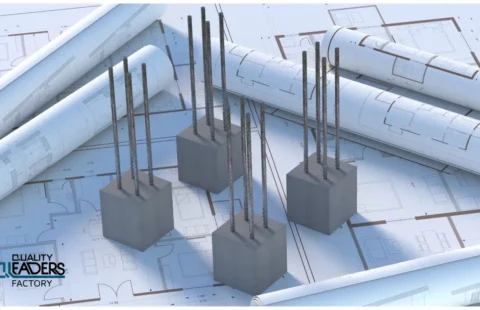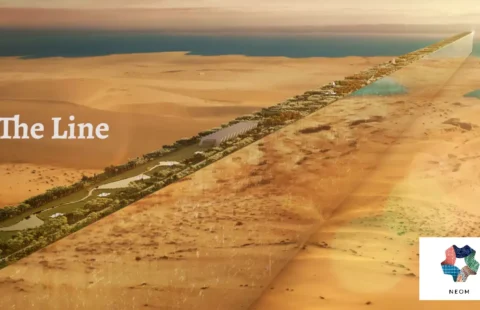
Challenges and Opportunities in the Construction Sector in Saudi Arabia
Introduction:
The construction sector in Saudi Arabia presents a landscape ripe with both challenges and opportunities. As the kingdom undergoes ambitious economic diversification and infrastructure development initiatives, stakeholders face hurdles such as regulatory complexities and fluctuating market conditions. However, these challenges are accompanied by significant opportunities, including substantial government investments, technological advancements, and a growing demand for sustainable construction practices. Navigating this dynamic environment requires strategic foresight and adaptive approaches to capitalize on emerging trends and ensure sustainable growth.
Regulatory Framework for Industrial Construction in Saudi Arabia
Navigating the intricate regulatory landscape is crucial for Saudi Arabia’s construction industry stakeholders. The kingdom’s regulatory framework for industrial construction is pivotal, setting standards and guidelines that shape project feasibility and execution. Compliance with Saudi building codes, zoning laws, and environmental regulations is mandatory, influencing project design, permit acquisition, and operational phases.
Saudi Arabia’s Vision 2030 initiative underscores the government’s commitment to fostering a robust regulatory environment conducive to industrial growth. This vision aims to streamline processes, enhance transparency, and attract foreign investment by aligning regulations with international standards. Stakeholders must stay abreast of regulatory updates to mitigate risks, ensure project continuity, and capitalize on emerging opportunities.
The evolving regulatory framework presents challenges, including compliance costs and procedural complexities. However, proactive engagement with regulatory bodies and adherence to best practices can unlock innovation and sustainable development opportunities. By embracing regulatory changes and leveraging them strategically, stakeholders can navigate challenges effectively and contribute to the kingdom’s ambitious industrialization goals.
Technological Advancements in Saudi Arabia’s Construction Industry
Technological advancements are revolutionizing the best general contracting company in Saudi Arabia, offering new avenues for efficiency, sustainability, and innovation. These technologies, from advanced materials to cutting-edge construction techniques, reshape how projects are planned, executed, and maintained.
Saudi Arabia’s Vision 2030 initiative has spurred investments in smart infrastructure and digital transformation, driving the adoption of Building Information Modeling (BIM), automated construction equipment, and renewable energy solutions. These innovations enhance project precision and speed and contribute to environmental sustainability goals.
Despite the promising benefits, integrating new technologies poses challenges, including initial investment costs and workforce upskilling requirements. However, proactive adoption strategies and collaboration with technology providers and industry experts can mitigate these challenges and maximize returns.
The rapid pace of technological evolution in Saudi Arabia’s construction sector presents opportunities for stakeholders to differentiate themselves in the market, improve project outcomes, and lead industry innovation. By embracing these advancements strategically and fostering a culture of continuous improvement, stakeholders can position themselves for sustainable growth and contribute to the kingdom’s vision for a diversified, technologically advanced economy.
Project Management in Industrial Construction: Navigating Complexity for Success
Effective project management is pivotal in Saudi Arabia’s industrial construction sector, where complexity and scale define many initiatives. From mega-infrastructure projects to industrial complexes, meticulous planning, execution, and monitoring are essential for achieving project goals within time and budget constraints.
Project management practices are crucial in Saudi Arabia’s Vision 2030, emphasizing infrastructure development as a cornerstone of economic diversification. While adhering to stringent quality and safety standards, stakeholders must navigate resource allocation, logistics coordination, and stakeholder management challenges.
Adopting advanced project management methodologies, including Agile and Lean practices, is gaining traction in the kingdom. These approaches enhance flexibility, promote collaboration among multidisciplinary teams, and streamline decision-making processes. Digital project management tools and platforms also facilitate real-time data analysis, enabling proactive risk management and informed decision-making.
Despite these advancements, project management in Saudi Arabia’s industrial construction sector faces challenges such as workforce skill gaps and geopolitical uncertainties. However, proactive mitigation strategies, continuous skills development, and robust contingency planning can mitigate these risks.
By prioritizing effective project management practices, stakeholders can optimize project outcomes, enhance stakeholder confidence, and contribute to the kingdom’s sustainable development objectives. Embracing innovation and fostering a culture of adaptability is crucial in navigating complexities and seizing opportunities in Saudi Arabia’s evolving industrial construction landscape.
Construction Technologies and Materials Used in Industrial Construction: Driving Efficiency and Sustainability
The construction industry in Saudi Arabia is witnessing a transformative shift driven by innovative technologies and advanced materials. These developments enhance operational efficiency and promote sustainable practices in industrial construction projects across the kingdom.
Technological advancements such as Building Information Modeling (BIM), prefabrication, and modular construction techniques are revolutionizing project delivery. BIM, in particular, facilitates collaborative design and construction planning, reducing errors and optimizing resource utilization. Prefabrication and modular construction methods accelerate project timelines while minimizing on-site disruptions and waste generation.
In line with Saudi Arabia’s Vision 2030 environmental sustainability goals, there is a growing emphasis on using eco-friendly construction materials. These include recycled aggregates, sustainable concrete mixes, and energy-efficient building systems. Such materials reduce environmental impact and contribute to operational cost savings over the project lifecycle.
Adopting new technologies and sustainable materials presents challenges, including initial investment costs, procurement complexities, and regulatory compliance. However, proactive engagement with technology providers, continuous skills development, and strategic partnerships can mitigate these challenges and optimize project outcomes.
By strategically embracing construction technologies and sustainable materials, stakeholders can drive efficiency, enhance project resilience, and contribute to the kingdom’s ambitious development objectives. Leveraging innovation and fostering a culture of continuous improvement is essential for navigating complexities and seizing opportunities in Saudi Arabia’s dynamic industrial construction sector.
Safety and Risk Management in Industrial Construction: Prioritizing Excellence and Accountability
Safety and risk management are paramount in Saudi Arabia’s industrial construction sector, where large-scale projects and complex operations demand rigorous adherence to standards and proactive mitigation strategies. Ensuring the safety of workers, protecting assets, and managing operational risks are essential to achieving project milestones and maintaining stakeholder confidence.
Saudi Arabia’s Vision 2030 agenda underscores the importance of safety and sustainability in all development initiatives. Regulatory frameworks enforce stringent safety protocols, requiring stakeholders to implement comprehensive risk assessment processes, safety training programs, and emergency response plans. These measures safeguard personnel and mitigate potential disruptions to project timelines and budgets.
Advanced technologies play a pivotal role in enhancing safety and risk management practices. IoT-enabled sensors, real-time monitoring systems, and predictive analytics tools provide valuable insights into site conditions, equipment performance, and potential hazards. Proactively using these technologies enables early intervention and preemptive measures to mitigate risks before they escalate.
Despite these advancements, challenges such as cultural perceptions of safety, workforce compliance, and evolving regulatory requirements persist. However, fostering a safety culture, promoting continuous education, and investing in state-of-the-art safety equipment can mitigate these challenges and enhance overall project resilience.
By prioritizing safety and risk management excellence, stakeholders can uphold industry standards, protect human capital, and foster a productive work environment. Embracing innovation and integrating best practices ensure sustainable growth and contribute to Saudi Arabia’s vision for a safe, efficient, sustainable industrial construction sector.
Sustainable Practices in Industrial Construction: Building for the Future
In Saudi Arabia’s dynamic construction industry, sustainability has emerged as a cornerstone of development strategies, driven by the kingdom’s commitment to environmental stewardship and resource efficiency. Sustainable industrial construction practices mitigate environmental impact and enhance operational efficiency and long-term economic viability.
Saudi Arabia’s Vision 2030 initiative emphasizes sustainable development as a critical pillar for achieving diversified economic growth. Adopting green building certifications, such as LEED (Leadership in Energy and Environmental Design) and Estidama, underscores the industry’s shift towards sustainable design, construction, and operation practices. These certifications prioritize energy efficiency, water conservation, and materials sustainability, aligning with global best practices and regulatory requirements.
Innovative construction methods, such as modular and passive design strategies, enable stakeholders to reduce carbon footprints and minimize waste generation. Integrating renewable energy sources, such as solar panels and wind turbines, further enhances project sustainability by reducing reliance on fossil fuels and lowering operational costs.
Despite the benefits of sustainable practices, challenges such as initial investment costs, technological integration complexities, and market acceptance persist. However, strategic partnerships, government incentives, and stakeholder education initiatives are instrumental in overcoming these challenges and driving widespread adoption of sustainable construction practices.
By embracing sustainable practices in industrial construction, stakeholders can differentiate themselves in the market, attract environmentally conscious investors, and contribute to Saudi Arabia’s broader sustainability goals. Investing in innovation, fostering collaboration across the industry, and prioritizing environmental responsibility are essential steps towards building a resilient and future-ready construction sector in the kingdom.
Financing Industrial Construction Projects: Navigating Financial Landscapes for Success
Securing financing for industrial construction projects in Saudi Arabia requires navigating complex financial landscapes and leveraging diverse funding sources. From mega-infrastructure initiatives to industrial complexes, stakeholders must adopt strategic approaches to ensure project feasibility, sustainability, and timely completion.
Saudi Arabia’s Vision 2030 initiative has catalyzed significant infrastructure and industrial development investments, attracting local and international investors. Financing options include traditional bank loans, project finance, public-private partnerships (PPP), and sovereign wealth fund investments. Each financing model offers unique advantages in risk allocation, capital structure, and financial sustainability.
The kingdom’s regulatory framework supports financial transparency and investor protection, providing a conducive environment for capital deployment. To mitigate financial uncertainties, Stakeholders must conduct comprehensive due diligence, assess project risks, and align funding strategies with long-term project goals.
Technological advancements, such as blockchain-based financing platforms and digital payment solutions, are transforming financial transactions and enhancing transparency in project financing. These innovations streamline fund disbursements, minimize transaction costs, and facilitate real-time monitoring of financial flows.
Despite these advancements, challenges such as fluctuating market conditions, currency exchange risks, and geopolitical uncertainties require proactive risk management strategies. Collaborative partnerships with financial institutions, government entities, and industry stakeholders can mitigate risks and optimize financing structures for sustainable project outcomes.
By embracing innovative financing approaches and fostering a resilient financial strategy, stakeholders can capitalize on opportunities, mitigate financial risks, and contribute to Saudi Arabia’s ambitious development objectives. Strategic planning, continuous market monitoring, and adherence to best practices ensure economic viability and position projects for long-term success in the kingdom’s evolving industrial construction sector.
Human Resource Management in Industrial Construction: Empowering the Workforce for Success
Effective human resource management is pivotal in Saudi Arabia’s construction industrial manufacturing sector, where skilled labor, safety compliance, and workforce productivity are critical for project success. Navigating the complexities of human capital management requires strategic planning, continuous skills development, and a commitment to fostering a positive work environment.
Saudi Arabia’s Vision 2030 initiative emphasizes the development of a skilled workforce capable of driving economic diversification and sustainable growth. Stakeholders in the construction industry must invest in recruiting, training, and retaining talent with specialized skills in engineering, project management, and technical trades.
Safety training and compliance with occupational health standards are paramount in ensuring worker well-being and project continuity. Robust safety protocols, regular audits, and proactive hazard identification measures mitigate risks and enhance workplace safety culture.
Technological advancements, such as workforce management software and digital training platforms, optimize resource allocation, streamline performance evaluations, and promote continuous learning among employees. These tools enable real-time monitoring of workforce productivity, skills development, and adherence to project timelines.
Challenges such as labor shortages, cultural diversity in the workforce, and regulatory compliance complexities necessitate proactive human resource management strategies. Collaboration with vocational training institutions, industry associations, and government entities can address these challenges and cultivate a skilled workforce aligned with industry demands.
By prioritizing human resource management excellence, stakeholders can enhance operational efficiency, foster employee engagement, and mitigate project risks. Investing in workforce development, promoting a safety culture, and embracing technological innovations are essential to building a resilient and competitive industrial construction sector in Saudi Arabia.
Industrial Construction Projects in the Oil and Gas Sector: Driving Saudi Arabia’s Energy Future
Industrial construction projects in Saudi Arabia’s oil and gas sector are pivotal in advancing the kingdom’s energy production capabilities and economic diversification efforts. As a global leader in oil reserves, Saudi Arabia continues to invest in infrastructure development to enhance operational efficiency, expand capacity, and ensure sustainable energy supply.
The kingdom’s Vision 2030 initiative aims to reduce dependency on oil revenues by diversifying the economy and promoting investments in non-oil sectors, including renewable energy and petrochemicals. Industrial construction projects in the oil and gas sector are crucial to this strategy, contributing to job creation, technology transfer, and economic growth.
Key projects include the development of new refineries, petrochemical complexes, and LNG terminals to meet domestic demand and strengthen Saudi Arabia’s position as a global energy hub. These initiatives require adherence to stringent safety standards, environmental regulations, and project management practices to mitigate risks and ensure project success.
Technological innovations, such as advanced drilling techniques, enhanced recovery methods, and digital oilfield technologies, drive operational efficiencies and reduce environmental impact in the oil and gas sector.
These advancements improve resource utilization, minimize carbon emissions, and support sustainable development goals outlined in Vision 2030.
Despite the sector’s strategic importance, challenges such as fluctuating oil prices, geopolitical tensions, and regulatory complexities pose risks to project timelines and financial viability. Collaborative partnerships with international oil companies, financial institutions, and technology providers are essential for navigating these challenges and optimizing project outcomes.
By leveraging innovative technologies, fostering a skilled workforce, and embracing sustainable practices, stakeholders can capitalize on opportunities in Saudi Arabia’s evolving oil and gas sector. Strategic investments in infrastructure development and operational excellence are crucial for achieving the kingdom’s long-term energy security and economic prosperity.
Industrial Construction Projects in the Mining Sector: Fueling Saudi Arabia’s Mineral Resources Development
Industrial construction projects in Saudi Arabia’s mining sector are pivotal to unlocking its vast mineral resources and diversifying its economy beyond oil. With rich deposits of gold, copper, phosphate, and other minerals, Saudi Arabia invests in infrastructure to support exploration, extraction, and processing operations.
As part of Saudi Arabia’s Vision 2030 initiative, the mining sector is poised for significant growth, attracting investments in new mines, processing facilities, and infrastructure development. These projects aim to enhance resource utilization efficiency, promote job creation, and stimulate economic growth in remote regions.
Key projects include the development of integrated mining complexes, mineral processing plants, and logistics infrastructure to facilitate the transportation of raw materials and finished products. These initiatives require adherence to stringent environmental standards, community engagement, and sustainable mining practices to mitigate environmental impact and ensure social responsibility.
Technological advancements, such as automated mining equipment, remote sensing technologies, and digital mine planning tools, enhance operational efficiency and safety in the mining sector. These innovations optimize resource extraction, reduce operational costs, and minimize environmental footprint, aligning with global best practices in sustainable mining.
Despite the sector’s potential, challenges such as infrastructure deficits, regulatory uncertainties, and geopolitical risks require strategic planning and collaboration among stakeholders. Public-private partnerships, international collaborations, and innovative financing models are essential for overcoming these challenges and accelerating project development.
By leveraging its mineral wealth and embracing sustainable development principles, Saudi Arabia can position itself as a global leader in the mining industry. Investing in technology adoption, skills development, and community engagement will drive inclusive growth, foster economic diversification, and contribute to the kingdom’s long-term prosperity.
Industrial Construction Projects in the Manufacturing Sector: Fostering Saudi Arabia’s Industrial Growth
Industrial construction projects in Saudi Arabia’s manufacturing sector are pivotal to advancing the kingdom’s industrialization goals and economic diversification efforts. With a strategic focus on enhancing local production capabilities and reducing import dependency, the manufacturing sector plays a crucial role in creating jobs, promoting innovation, and driving sustainable economic growth.
Under Saudi Arabia’s Vision 2030 initiative, the manufacturing sector is targeted for significant expansion, with investments in new industrial zones, manufacturing facilities, and industrial parks. These projects aim to attract foreign investments, transfer technology, and develop local industries capable of producing high-value goods for domestic consumption and export.
Key projects include establishing automotive assembly plants, aerospace manufacturing facilities, and advanced industrial complexes with state-of-the-art production technologies. To ensure competitiveness and operational excellence, these initiatives require adherence to international quality standards, sustainable manufacturing practices, and efficient supply chain management.
Technological advancements, such as automation, robotics, and additive duct manufacturing, are revolutionizing production processes in the manufacturing sector. These innovations improve productivity, reduce production costs, and enhance product customization capabilities, positioning Saudi Arabia’s manufacturing industries at the forefront of global competitiveness.
Despite the sector’s growth prospects, challenges such as skills gaps, infrastructure development, and market volatility require proactive strategies and collaborative efforts. Public-private partnerships, vocational training programs, and industry collaborations are essential for addressing these challenges and fostering a resilient manufacturing ecosystem.
By investing in infrastructure, technology adoption, and workforce development, Saudi Arabia can accelerate industrial growth, stimulate economic diversification, and create sustainable employment opportunities. Embracing innovation, fostering entrepreneurship, and promoting industrial clusters will enable the kingdom to achieve its vision of becoming a leading global manufacturing hub.
Infrastructure Development for Industrial Construction: Enabling Saudi Arabia’s Economic Expansion
Infrastructure development supports industrial construction projects across Saudi Arabia, underpinning the kingdom’s economic expansion and diversification efforts. As part of Vision 2030, infrastructure investments are being made to enhance connectivity, logistics capabilities, and industrial productivity.
Key infrastructure projects include the development of transportation networks, logistics hubs, and energy distribution systems to support industrial clusters and economic zones. These initiatives aim to reduce transportation costs, improve supply chain efficiency, and attract investments in diverse sectors, including manufacturing, logistics, and energy.
The kingdom’s commitment to sustainable development is reflected in infrastructure projects designed to minimize environmental impact and enhance resilience against climate change. Investments in renewable energy infrastructure, wastewater treatment facilities, and innovative city initiatives promote resource efficiency and improve the quality of life for residents and businesses.
Technological advancements, such as digital infrastructure planning tools, IoT-enabled monitoring systems, and AI-driven logistics solutions, optimize infrastructure development and operation. These innovations streamline project management, enhance operational transparency, and facilitate real-time decision-making to mitigate risks and ensure project success.
Despite the ambitious infrastructure agenda, funding constraints, regulatory complexities, and geopolitical factors require strategic planning and collaboration among government agencies, private sector partners, and international stakeholders. Public-private partnerships, innovative financing models, and regulatory reforms are essential for overcoming these challenges and accelerating infrastructure development.
By investing in robust infrastructure, Saudi Arabia can strengthen its competitive edge, attract investments, and support sustainable economic growth across various industries. Strategic infrastructure planning, technological innovation, and stakeholder collaboration will enable the kingdom to achieve its vision of becoming a global financial powerhouse and a hub for regional trade and commerce.



